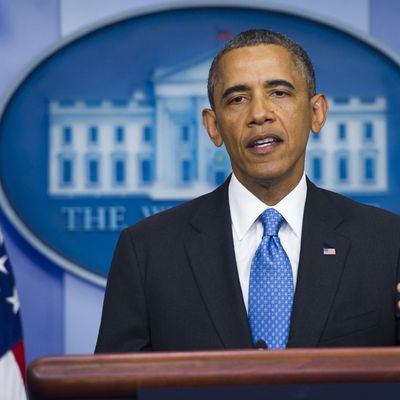
President Obama delivered an impromptu, instantly historic soliloquy on race today at the White House press conference, occasioned by the acquittal in the George Zimmerman trial. Obama has rarely spoken about race directly since taking office, but here was the unprecedented spectacle of an African-American president essentially explaining structural racism to America. Obama does not disagree with the legal verdict but found the shooting itself troubling.
But he used the occasion to speak more expansively on race from the perspective of an African-American than he ever has before — arguing how, verdict aside, the case triggered legitimate anger. African-Americans, he said, “get frustrated, I think, if they feel that there’s no context for it or — and that context is being denied. And — and that all contributes, I think, to a sense that if a white male teen was involved in the same kind of scenario, that, from top to bottom, both the outcome and the aftermath might have been different.” While acknowledging that there is no way for the federal government to intervene directly in cases like the Zimmerman trial, he suggested a few ways in which the government might respond: more racial bias training for law enforcement, closer examination of laws like Stand Your Ground, “some time in thinking about how do we bolster and reinforce our African-American boys,” and “some soul-searching.”
Why is Obama saying this? And why now? There are three things to bear in mind for how Obama approaches the subject of race:
First, he believes that racism remains a significant stain on American life. He knows that African-Americans, especially males, face different treatment from society — today he invoked the experience of being followed in a department store, seeing doors locked around him or women in elevators clutching their purses. And even acknowledging the statistical fact that black males disproportionately commit violence, he considers the treatment of the nonviolent majority a source of legitimate grievance that he personally shares.
Second, Obama believes that talking about race too much is not only useless — he dismissed “national conversations about race” — but, in his case, counterproductive. The entire Barack Obama political image has been built in large part around de-racialization — persuading white voters to put aside any preconceptions about race and to think of him in nonracial terms. Obama, according to one analysis, has “talked less about race than any other Democratic president since 1961.” His famed race speech about Jeremiah Wright during the 2008 campaign was, above all, an effort to put to bed the race issue. Being seen by white America as a spokesman for the black community, rather than America as a whole, has always been Obama’s number-one political nightmare. He spoke out today in spite of this instinct.
Third, Obama believes America’s racial problem has not only gotten dramatically better over the course of his life — it will continue to do so. Younger people are less racially biased than older people, and Obama believes that process will continue to rapidly transform America’s approach to race.
Point No. 3 may help explain the contradictions between No. 1 and No. 2. Obama understands that interjecting himself into a racialized controversy carries risks, but he also believes that the electorate of the future is on his side. His remarks are probably aimed not at the present but at posterity.






























